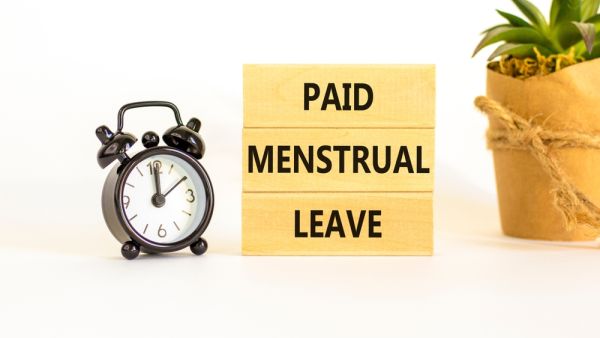The conversation around menstrual leave has been going around for some time now, with some seeing it as a right and others viewing it as counterproductive.
But what does a menstrual leave really mean, and how will it impact work cultures and employees?
Menstrual leave is one or two-day leaves that are given to females who are experiencing extreme period pain. While menstrual leave is different from the normal sick days that companies give, they are viewed by many as an essential way to help women cope with period pain.
One study reports that around 85% of women in America said that period cramps are most likely to impede their daily activities. This means that 1 out of every 3 women tends to avoid daily activities when menstruating. And with women making up around 40% of the global workforce, it is imperative for companies to consider providing menstrual leave to show support and understanding.
The reality of things is that so many women go to work and opt to suffer silently because they are not given the support and understanding they need to confidently say, “yes, I’m menstruating and in pain, so I would appreciate a day or two off to better cope.” Because, unlike your colleague jog who broke his leg while working out, women are not given the option to take time to cope with period pain.
Most times, women are expected to pull it together and give it their all, even when they are bleeding and in pain - literally.
Impact of menstrual leaves on work culture and employees
If you ask anyone how they might perform at work when they are not feeling well, chances are most will say they will not be performing to the best of their abilities. So why is it hard for companies and leaders to understand that women who experience period pain and cramps will also not be as productive as they usually are?
A 2017 study was conducted in the Netherlands to understand the impact of period cramps on productivity. The study showed that every year each employee loses around 9 days of productivity when working in pain. This is bad news for employers and thus the idea to give women the buffer they need to accommodate their pain is beneficial for employers as much as it is for employees.
Another survey done in Australia highlighted that women struggled to juggle both the pain of menopause and work, with only 3% saying they felt supported at work and 60% saying the support they received was “poor” or “below average”. In addition, 83% of women said they felt their symptoms negatively impacted their work.
Experts also said that empathizing with employees and showing support will result in better talent retention, increased productivity, and fostering an overall better and more supportive workplace. In fact, a 2021 UK Standard Chartered Bank study reports that 25% of employees are likely to quit due to their symptoms and lack of support and understanding. Whereas, 22% said they would probably retire early for the same reasons.
Who has menstrual leaves in place?
While most countries are still not granting menstrual leave, some countries are leading the game when it comes to supporting women in that area.
- South Korea
Women in South Korea have been given a day off per month for menstrual pain back since 1953. In fact, the South Korean government is taking the matter seriously and says it would fine any employer who refuses to do so.
In 2017, the ex-head of Asiana Airlines, Kim Soo-Cheon, was fined $1,800 for asking employees to prove their need for a menstrual leave.
- Indonesia
Indonesia has also been offering paid menstrual leave for women. The ILO reports that the law states that each woman has the right to 2 paid leave days each month. However, many employers are not implementing the policy thoroughly, with some offering one day per month and others ignoring it completely.
- Taiwan
Taiwan’s Act of Gender Equality in Employment grants women 3 menstrual leave days per year. In case women take more than these 3 days then the extra days will be considered as sick days. However, in both cases, women will be paid half the regular wage when taking menstrual leaves.
- Japan
While Japan introduced menstrual leave back in 1947, it is reported that less than 1% of women ask for it. This might be because menstrual leave is usually unpaid in Japan.
- Zambia
The first and only African country to offer menstrual leave, Zambia passed a law in 2015 that gives women the right to take a day off on their period without giving notice or providing medical proof.
However, even though Zambia has made progress and gave women the right to take days off, talking about periods is considered to be a taboo. Thus, women usually refer to period days as “Mother’s Day”.
- China
Even though period leave is not normalized in all of China, some provinces already have policies in place that grant women the right to have leaves to manage their period pain. Some of these provinces include Shanxi, Hubei, Anhui, Ningxia, and Qinghai.
- Spain
Having introduced a draft bill that gives women menstrual leave, Spain seems to be on the verge of becoming the first European country to put menstrual leave in place.
But Spain is not the only country that is considering passing period leave policies, because Morocco is also doing that! It is reported that if a bill is passed, Morocco can become the second African country to have menstrual leaves in place.
Even though the world might still have quite a way to go to fully implement menstrual leaves and destigmatize it, some companies are already paving the way to give women the right to have menstrual leaves. For instance, Australian period-underwear company Modibodi started giving women menstrual, menopause, and miscarriage leaves last year.
“We’ve introduced these policies as part of our commitment to talk openly and honestly about periods, to normalize conversations about menstruation and to remove any stigma and shame associated with a normal, natural part of life. To help change those attitudes, we need to start in our own office, and this new policy is one action we can take now to help do that.” - Kristy Chong, CEO and Founder of Mobidi
Bristol Firm Coexist has also passed period leave policies back in 2016 to help fight the stigma around periods. Nuvento Inc, a global software company in the US, also grants women a one-day period leave per month. In addition, Indian companies like Byju’s and Zomato also provide the option for their employees to take period leave.
Even though UAE is among the countries that still have not passed laws to support period leave, Fine Hygienic Holding started offering its employees a one day period leave per month earlier last year. Another important milestone was crossed in the region when Egyptian digital marketing company, Shark and Shrimp, became the first company in the Arab world to grant women a monthly day off to help them manage their period pain.
@bloodyhonest #stitch with @c4news In an ideal world, specific “menstrual leave” wouldn’t be necessary. ?♀️ #menstrualleave #periodtok #periods #bloodyhonest #chronicillness ♬ original sound - Bloody Honest
However, the support for menstrual leave can be a tricky one if not handled correctly. That is because some might view period leave as a weakness and reinforcement for the idea that women can be too emotional or sensitive. Moreover, others might view this as a way to widen the gender gap. That is why it is imperative that more awareness is raised about the natural cycle of the female body and that the conversation around periods is normalized.
So many women still struggle with using their period products at work because they are worried their male colleagues might find out. And thus it is crucial that the stigma around periods is diminished and replaced by awareness that menstruation is not a taboo.











